I'm Still Here

Plot
In the midst of Brazil's turbulent 1970s, where the military dictatorship has taken hold of the country, "I'm Still Here" presents a gripping portrayal of life under repression. The Paiva family, comprising patriarch Rubens, matriarch Eunice, and their five children, enjoys a relatively carefree existence in their idyllic beachside home in Rio. Rubens, a passionate and charismatic man with many friends, has turned his house into an open sanctuary where they can gather, socialise, and exchange their thoughts and ideas. The villa, which is frequently filled with music, laughter, and lively debates, becomes a temporary refuge for a diverse group of intellectuals and activists. However, this sense of community and freedom is short-lived. One fateful day, Rubens is taken away by the military authorities, never to return. His wife, Eunice, and their children are left to grapple with the uncertainty of Rubens' disappearance, while their lives are forever altered by the harsh reality of his 'temporary' detainment. As the days turn into weeks, the Paiva family struggles to come to terms with the disappearance of their loved one. Eunice, determined to find her husband, sets out to locate him, but every door she knocks on seems to lead to a dead end. The authorities remain tight-lipped about Rubens' whereabouts, and as the family's hopes begin to dwindle, they are left with nothing but unanswered questions. As the months pass by, the Paiva children become increasingly anxious and concerned about their father's safety. eldest son, Caio, feels a deep sense of responsibility towards his family and tries to navigate the complex web of bureaucratic red tape to uncover any clues about his father's disappearance. Meanwhile, his younger siblings, particularly the twins Fernando and Tiago, are increasingly withdrawn, struggling to cope with the emotional toll of their father's vanishing. The film masterfully interweaves the Paiva family's narrative with the broader context of Brazil's tumultuous history during this period. The scenes of protests, arrests, and police brutality serve as a stark reminder of the regime's oppressive nature, underscoring the risks and dangers faced by individuals attempting to challenge the status quo. Despite the Paiva family's growing desperation, "I'm Still Here" also highlights their courage, resilience, and solidarity. Through their shared struggles and fears, the family members find strength in one another, even as their love for Rubens remains a beacon of hope in the face of uncertainty. Their determination to uncover the truth about his disappearance becomes a collective endeavour, a testament to the enduring power of their love and devotion. The film's focus on the Paiva family's poignant story serves as a backdrop for a searing commentary on the human cost of repressive regimes. By shedding light on the narratives of individuals caught up in the machinery of oppression, "I'm Still Here" challenges viewers to empathise with the victims of tyranny and to confront the darkest aspects of our collective past. The Brazilian film scene has given the world many powerful and thought-provoking works. "I'm Still Here", with its poignant narrative, nuanced characters, and thoughtful direction, solidifies its position as one of the country's cinematic masterpieces.
Reviews
Journey
Whether it's a genuine documentary or a mockumentary, I've always admired Joaquin, and this film is indeed entertaining, touching upon some real aspects of life. It's a shame that after the initial novelty, the film just stagnates, unable to delve deeper. The truth of its authenticity is no longer important; what truly matters is when Joaquin will finally make his comeback.
Nathan
This long-prepared prank went too far. Perhaps Joaquin Phoenix's highly publicized career change from acting to music was something he later regretted, leading to this mockumentary as a way to backtrack and explain it all. Director Casey Affleck has admitted the film is fictional and that Joaquin was acting. I can only say they must have been incredibly bored! Joaquin, if you knew it would take this much effort to cover up your lies, why did you play it so grandiosely in the first place? ★★★
Aaliyah
So raw, so rough, yet it cuts right to the heart.
Mckenzie
When is Casey going to film his own documentary? I'd watch it no matter how bad it is!
Kenneth
Knowing it's likely Casey and Joaquin cooked this up while high, "I'm Still Here" is surprisingly fascinating. Highly recommend a watch, especially with Joaquin's recent Best Actor nomination. What a rollercoaster life. Of course, he probably couldn't care less about the Academy – awards are meaningless to him. Which makes the idea of them actually giving him the Oscar even more hilarious...
Recommendations




